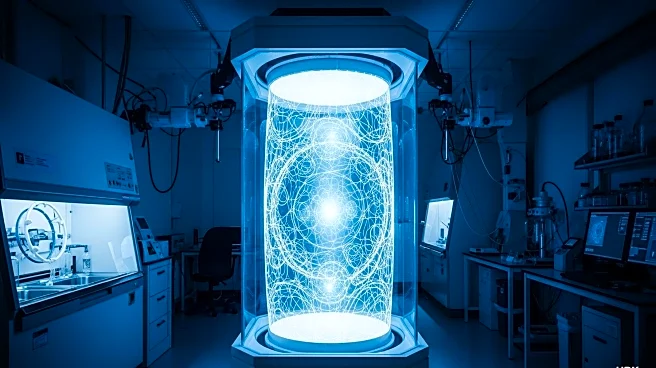What is the story about?
What's Happening?
Scientists at the Centre for Cellular and Molecular Biology (CCMB) in Hyderabad have unveiled a groundbreaking mechanism known as 'Programmed Cell Revival'. This discovery reveals that cells possess an inherent ability to recover from damage and regenerate tissues, challenging the traditional belief that cell death is irreversible. Led by Dr. Santosh Chauhan, the research demonstrated that this revival process accelerates healing in various organisms, including skin wound healing in mice and nerve repair in worms. The study, published in the EMBO Journal, suggests that cells can reactivate developmental, metabolic, and immune pathways to restore their functions. The findings have significant implications for regenerative medicine and cancer biology, prompting a reevaluation of existing understanding in these fields.
Why It's Important?
The discovery of Programmed Cell Revival has the potential to revolutionize regenerative medicine by offering new strategies for tissue repair and healing. This mechanism could enhance treatments for injuries and degenerative diseases, providing a new avenue for medical advancements. However, the revival process also poses challenges for cancer treatment, as it may reduce the efficacy of therapies by allowing cancer cells to regain stem-like properties, potentially leading to more aggressive tumors. The dual nature of this discovery highlights the need for careful consideration in its application, balancing the benefits for regenerative medicine against the risks in oncology.
What's Next?
The CCMB scientists have filed for Indian and international patents for their discovery, indicating potential future developments in medical applications. Researchers and medical professionals may explore ways to harness Programmed Cell Revival for therapeutic purposes while mitigating risks in cancer treatment. Further studies are likely to focus on understanding the mechanisms in greater detail and developing targeted interventions that maximize benefits while minimizing adverse effects. The scientific community may also engage in discussions on ethical considerations and regulatory frameworks for implementing such advanced biological techniques.
Beyond the Headlines
The discovery of Programmed Cell Revival could lead to a paradigm shift in how life, death, and healing are perceived at the cellular level. It challenges existing dogmas and opens up new ethical and scientific debates about the manipulation of cellular processes. The potential for cells to revive and regenerate raises questions about the limits of biological intervention and the implications for human health and longevity. As research progresses, it may also influence cultural perceptions of healing and recovery, prompting broader societal discussions on the future of medicine and biotechnology.















